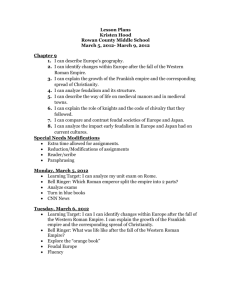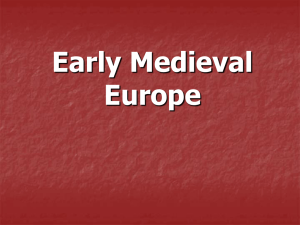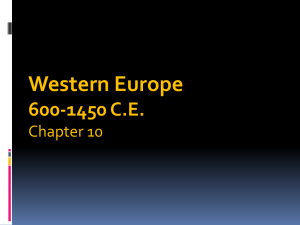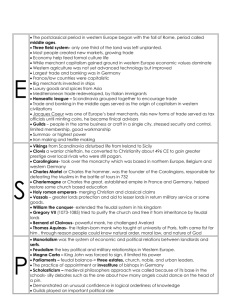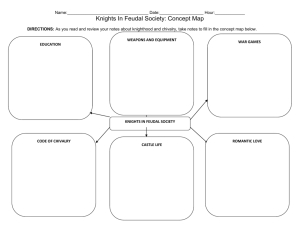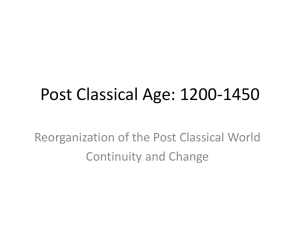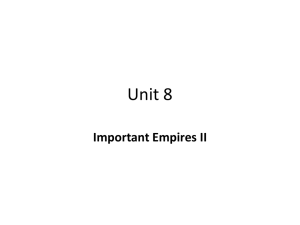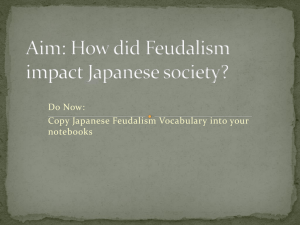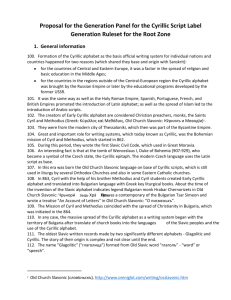Unit 6 Middle Ages Renaissance Concepts
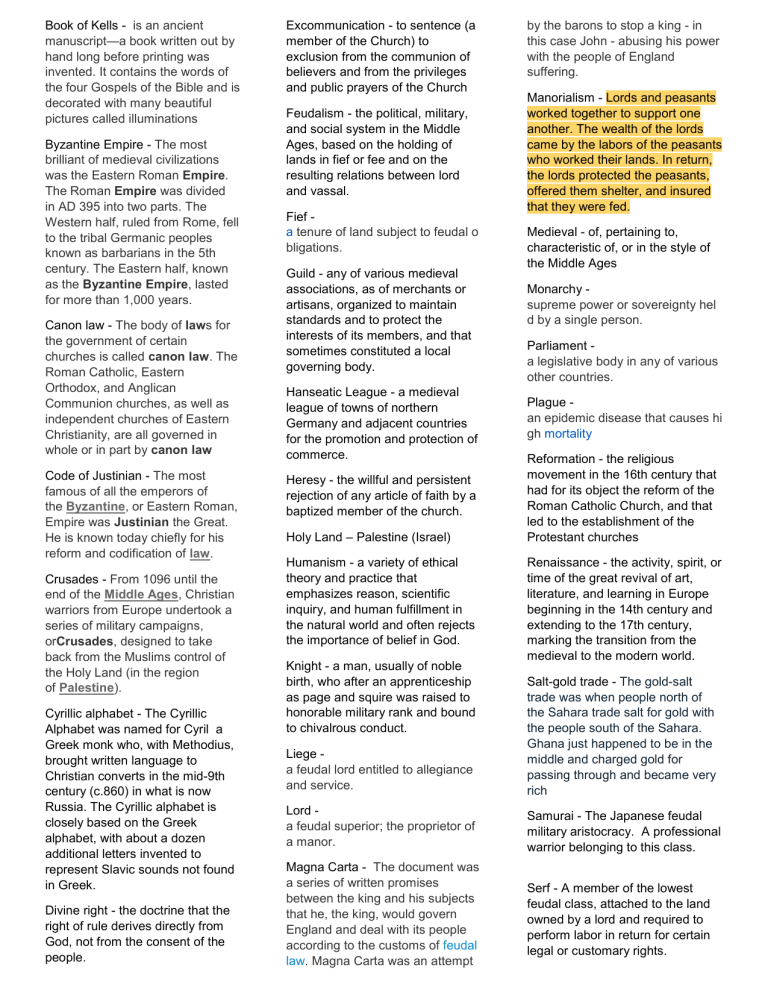
Book of Kells - is an ancient manuscript —a book written out by hand long before printing was invented. It contains the words of the four Gospels of the Bible and is decorated with many beautiful pictures called illuminations
Byzantine Empire - The most brilliant of medieval civilizations was the Eastern Roman Empire .
The Roman Empire was divided in AD 395 into two parts. The
Western half, ruled from Rome, fell to the tribal Germanic peoples known as barbarians in the 5th century. The Eastern half, known as the Byzantine Empire , lasted for more than 1,000 years.
Canon law - The body of law s for the government of certain churches is called canon law . The
Roman Catholic, Eastern
Orthodox, and Anglican
Communion churches, as well as independent churches of Eastern
Christianity, are all governed in whole or in part by canon law
Code of Justinian - The most famous of all the emperors of the Byzantine , or Eastern Roman,
Empire was Justinian the Great.
He is known today chiefly for his reform and codification of law .
Crusades - From 1096 until the end of the Middle Ages , Christian warriors from Europe undertook a series of military campaigns, or Crusades , designed to take back from the Muslims control of the Holy Land (in the region of Palestine ).
Cyrillic alphabet - The Cyrillic
Alphabet was named for Cyril a
Greek monk who, with Methodius, brought written language to
Christian converts in the mid-9th century (c.860) in what is now
Russia. The Cyrillic alphabet is closely based on the Greek alphabet, with about a dozen additional letters invented to represent Slavic sounds not found in Greek.
Divine right - the doctrine that the right of rule derives directly from
God, not from the consent of the people.
Excommunication - to sentence (a member of the Church) to exclusion from the communion of believers and from the privileges and public prayers of the Church
Feudalism - the political, military, and social system in the Middle
Ages, based on the holding of lands in fief or fee and on the resulting relations between lord and vassal.
Fief - a tenure of land subject to feudal o bligations.
Guild - any of various medieval associations, as of merchants or artisans, organized to maintain standards and to protect the interests of its members, and that sometimes constituted a local governing body.
Hanseatic League - a medieval league of towns of northern
Germany and adjacent countries for the promotion and protection of commerce.
Heresy - the willful and persistent rejection of any article of faith by a baptized member of the church.
Holy Land – Palestine (Israel)
Humanism - a variety of ethical theory and practice that emphasizes reason, scientific inquiry, and human fulfillment in the natural world and often rejects the importance of belief in God.
Knight - a man, usually of noble birth, who after an apprenticeship as page and squire was raised to honorable military rank and bound to chivalrous conduct.
Liege - a feudal lord entitled to allegiance and service.
Lord - a feudal superior; the proprietor of a manor.
Magna Carta - The document was a series of written promises between the king and his subjects that he, the king, would govern
England and deal with its people according to the customs of feudal law . Magna Carta was an attempt by the barons to stop a king - in this case John - abusing his power with the people of England suffering.
Manorialism - Lords and peasants worked together to support one another. The wealth of the lords came by the labors of the peasants who worked their lands. In return, the lords protected the peasants, offered them shelter, and insured that they were fed.
Medieval - of, pertaining to, characteristic of, or in the style of the Middle Ages
Monarchy - supreme power or sovereignty hel d by a single person.
Parliament - a legislative body in any of various other countries.
Plague - an epidemic disease that causes hi gh mortality
Reformation - the religious movement in the 16th century that had for its object the reform of the
Roman Catholic Church, and that led to the establishment of the
Protestant churches
Renaissance - the activity, spirit, or time of the great revival of art, literature, and learning in Europe beginning in the 14th century and extending to the 17th century, marking the transition from the medieval to the modern world.
Salt-gold trade - The gold-salt trade was when people north of the Sahara trade salt for gold with the people south of the Sahara.
Ghana just happened to be in the middle and charged gold for passing through and became very rich
Samurai - The Japanese feudal military aristocracy. A professional warrior belonging to this class.
Serf - A member of the lowest feudal class, attached to the land owned by a lord and required to perform labor in return for certain legal or customary rights.
Shogan - the title applied to the chief military commanders from about the 8th century a.d. to the end of the 12th century, then applied to the hereditary officials who governed Japan, with the emperor as nominal ruler, until
1868
Silk Road - an ancient trade route between Chi na and the Mediterranean (4,000 miles); followed by Marco Polo in t he13th century to reach Cathay
Utopia - any visionary system of political or social perfection.
Vassal - a person granted the use of land, in return for rendering homage, fealty, and usually military service or its equivalent to a lord or other superior; feudal tenant.
Bartolomeu Dias - a Portugese navigator whose 1487-88 Atlantic voyage around the southern tip of
Africa opened sea routes between
Europe and Asia
Cervantes - 1547--1616, Spanish dramatist, poet, and prose writer, most famous for Don Quixote
(1605), which satirizes the chivalric romances and greatly influenced the development of the novel
Charlemagne -
( "Charles the Great" ) a.d. 742 –
814, king of the Franks 768 –
814; as Charles I, emperor of the
Holy RomanEmpire 800 –814.
Columbus - Italian navigator in
Spanish service: traditionally considered the discoverer of
America 1492.
Da Vinci - 1452 –1519, Italian painter, sculptor, architect, musician, engineer, mathematician, and scientist.
Dante - is considered to be one of the most important, inspired writers of the Middle Ages. His main work, the Commedia or the Divine
Comedy is a verse work which combines both allegory and the real, in the hopes of promoting a true spiritual path for readers toward redemption and ascension into heave
Descartes -
French philosopher and mathemat ician.
Galileo -
Italian physicist and astronomer.
Henry Hudson -
English navigator and explorer.
Joan of Arc - French national heroine and martyr who raised the siege of Orleans; Saint known as
"The Maid of Orleans." Emerged from obscurity on 1429 to save
France. She believed that she had received a revelation from God commanding her to find dauphin, the heir to the French throne, and see that he was crowned king.
Then she was to help him drive the
English out of France. After the dauphin was crowned as Charles the VII, Joan dictated a letter to the
English, calling on them to withdraw. Captured by Burgundian allies of the English and burned at the stake.
Johann Gutenberg - German printer who was the first in Europe to print using movable type and the first to use a press
John Cabot - Italian navigator in the service of England: discoverer of North American mainland 1497.
Keppler - The Renaissance astronomer and astrologer
Johannes Kepler is best known for his discovery that the orbits in which the Earth and the other planets of the solar system travel around the sun are elliptical, or oval, in shape.
Locke - One of the pioneers in modern thinking was the English philosopher John Locke . He made great contributions in studies of politics, government, and psychology.
Machiavelli - Florentine statesman and political philosopher; secretary to the war council of the Florentine republic founder of political ethics
Magellan - Portuguese navigator: discoverer of the Straits of
Magellan 1520 and the Philippines
1521.
Mansa Musa - Mansa Musa, king of the Mali empire in West Africa, is known mostly for his fabulous pilgrimage to Mecca and for his promotion of unity and prosperity within Mali.
Martin Luther - German theologian and author: leader, in Germany, of the Protestant Reformation.
Michelangelo -
Italian sculptor, painter, architect, a nd poet.
Montesquieu - French political philosopher. His chief works, a comparative analysis of various forms of government, which had a profound influence on political thought in Europe and the US
Newton - English philosopher and mathematician: formulator of the law of gravitation.
Richard the Lion-Hearted - king of
England (1189--99); a leader of the third crusade
Rousseau - was a Genevan philosopher, author, and composter. His political philosophy had a strong influence on the
French Revolution and modern political and sociological thought
Saladin - was a Kurdish Muslim who was the first Sultan of Syria and Egypt.
Shakespeare - was an English author who is world famous for his classic dramas.
Vasco da Gama - was a
Portuguese explorer who was the first to sail directly from Europe to
India.
William the Conqueror - was the first Norman King of England , reigning from 1066 until his death in 1087. Descended from Viking raiders
